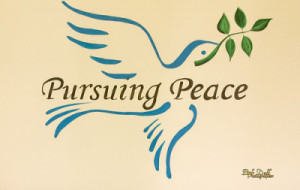Peace Advocacy in the Western Plains

Once again, I find the writings of one of my favorite bloggers, Derek Maul, appropriate for expressing a vision of peace. Following is an excerpt from his Advent devotional booklet, “In My Heart I Carry a Star.”
“And you, child, will be called the prophet of the Most High;
for you will go before the Lord to prepare his ways,
to give knowledge of salvation to his people
by the forgiveness of their sins.
By the tender mercy of our God,
the dawn from on high will break upon us,
to give light to those who sit in darkness and in the shadow of death,
to guide our feet into the way of peace.”
Luke 1: 76-79
John the Baptist’s father, Zechariah, saw the Advent of the coming Christ as a clarion call to peace: Jesus as our guide; the tender mercies of God breaking open like the dawn; real light made evident where things had once been grim and dark. Forgiveness of sins would counter the shadow of ongoing defeat. What a vision, and what an inspiration!
But what on earth have we been doing here in this twenty-first century? What have we been up to, to demonstrate that we have chosen to follow Jesus? How do we participate actively in this vision and bring healing peace into the reality of our world?
A lot has been said about peace during this most turbulent past hundred years. There have been speeches, poetry, and folktales; countless hopes; beautiful dreams; and innumerable songs. But reality reveals a tragic contradiction. The more we talk about peace, the less tranquility and harmony we seem to actually witness.
My grandparents would tell stories about 1918, when millions of people stood in throngs on Armistice Day, both in London and around the world. It was a stirring sight, they said, and they cried passionately with all their hearts, “Never again!” And they believed it.
In my hometown of Folkestone, in the south of England, the hill the boys marched down on their way to the ships was later named the Road of Remembrance. But what did we all remember?
We remembered so poorly that, even though President Wilson won the Nobel Peace Prize for his efforts to establish the League of Nations in 1919, the U.S. government neither ratified the charter nor joined the organization. We remembered so poorly that the world went at it again, just two decades later. We killed one another off by the tens of millions. As Europe hurtled toward war in 1938, Britain’s prime minister, Neville Chamberlain, signed the Munich Agreement. He desperately wanted things to be different, and he declared “peace in our time.” But it was more like whistling in the dark, a move that virtually guaranteed a more devastating confrontation. He did not understand that real peace has nothing to do with fear.
Unless we find a way to actively engage “the tender mercy of our God,” and then make sure it really does break in like the dawn (Luke 1: 78), our failed attempts at peace are always going to fall short and only be added to the list of hopeless clichés. In the 1960’s, flower children stuck flowers in the barrels of National Guardsmen’s guns; meanwhile, other young people died in the struggle for Vietnam.
Beatle John Lennon’s haunting plea to “Give Peace a Chance” became the anthem of a generation, but he was murdered by a dark soul frantic for attention and in serious need of God’s tender mercies. We all concur that the world needs to know a lasting and meaningful peace. Peace remains elusive and at best conditional and temporal in a world defined more and more by conflict and pain.
What are we really talking about, then, when we throw the word peace around so easily yet so earnestly? The dictionary defines peace most notably in the negative. It’s a treaty to cease hostilities; it’s the absence of mental stress or anxiety. Peace is harmonious relations; it’s freedom from disputes; it’s the prevailing state during the absence of war; it’s the absence of armed conflict; it’s a kind of public quiet.
Most of us buy into the “absence of” model on a regular basis. Have you ever walked into your kitchen and announced, at the top of your lungs “ALL I WANT AROUND HERE IS A LITTLE PEACE AND QUIET!!!”
Jesus is the Prince of Peace; we can find the antidote to our most common misconceptions in the person, the actions, and the message of Christ. His beautiful way challenges us to see peace not as a negative or neutral condition but as dynamic, purposeful, and vigorous.
The peace of God is not so much the absence of anything as it is the presence of so much. We can begin by inviting the tender mercies of our God to bring light into whatever darkness we find around us. We can be the presence of Jesus in this world. We can renew our commitment to God’s way. We can make a difference.
Prayer: Gracious God, author of our lives, thank you for your active and purposeful love. Wash us with the refreshing waters of your peace. Use us to bring that peace to our world. Challenge us to serve you faithfully. Amen.
Blessings – Terri
